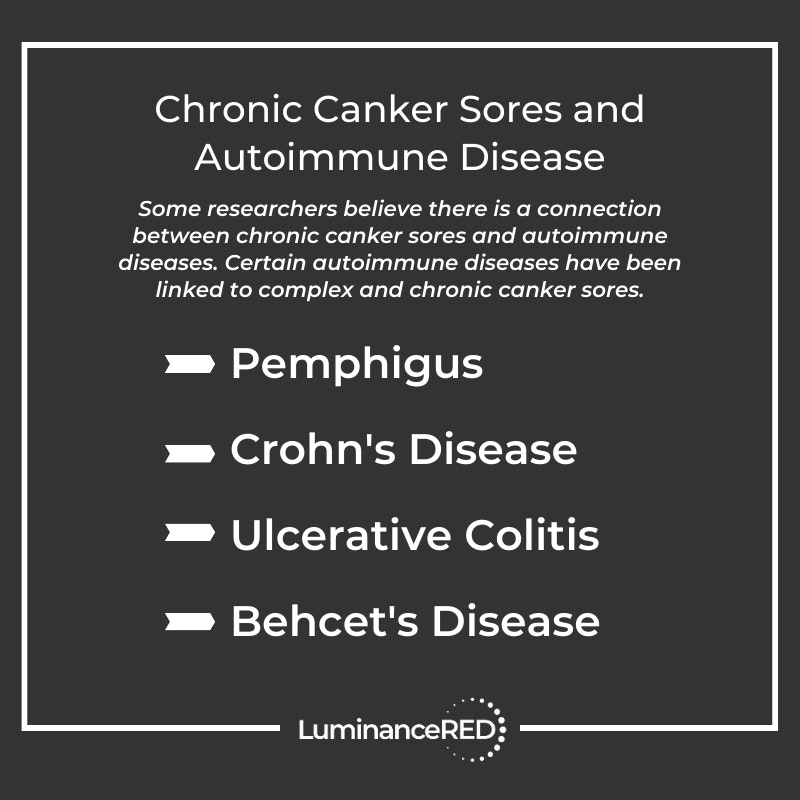Do Chronic Canker Sores Hint at Autoimmune Conditions?

It’s perfectly normal to develop canker sores from time to time. Eating foods that are too acidic or spicy can cause these painful mouth ulcers to form, as can biting your tongue or cheek. Most of the time, canker sores heal on their own within a week or two.
But what about recurring mouth sores, or a mouth sore that lingers longer than normal? Could it be a symptom of a deeper health issue, like an autoimmune disease?
Let’s explore chronic canker sores, autoimmune conditions, and the connection between the two.

What Is a Canker Sore?
A canker sore (also called an aphthous ulcer) is a shallow lesion that develops on the fleshy parts of your mouth. This includes:
- The inside of your lips
- The inside of your cheeks
- Along the gumline
- The roof of your mouth
- Under your tongue
- On your tongue
Canker sores appear as white, gray, or yellow ulcers with a bright red or pink border. They usually measure between one and four millimeters (mm) in diameter.
While these mouth sores can be very painful, they generally aren’t dangerous. They’re not contagious, meaning they don’t spread from person to person like cold sores, and they aren’t caused by a virus.
Canker sores are very common — most people will experience this type of oral ulcer at some point in their lives. However, they’re more likely to affect young adults and teens, and they’re more common in women than men.
These mouth ulcers hurt quite a bit during the first few days after they form, but they usually heal completely within two weeks.
Now that you understand canker stores better, let’s explore their relationship with autoimmune disorders. Two types of mouth sores could indicate you have an autoimmune condition: chronic canker sores and complex canker sores.
Chronic Canker Sores and Autoimmune Disorders
A chronic condition is a health issue that persists for more than three months and has a significant effect on your daily activities and function. Chronic health problems often require ongoing medical attention. Not all chronic diseases are life-threatening, but they are likely to hinder your quality of life.
It’s possible for a person to develop chronic canker sores, also referred to as recurrent aphthous stomatitis. The exact cause of this inflammatory condition is unknown.
As with autoimmune disorders, chronic canker sores are related to an immune response within your body. The trigger for this response may be stress, hormones, allergies, trauma, poor nutrition, or dehydration. Bouts of recurrent aphthous stomatitis could also be genetic.
In most cases, each recurrence of oral ulcers will heal within seven to 10 days. The sores won’t come back right away, and most people with aphthous stomatitis only develop cankers about three to six times each year.
In rare cases, sores caused by aphthous stomatitis can develop so severely that eating becomes nearly impossible. In these rare cases, extreme weight loss and malnutrition are potential side effects.
The chronic canker sores caused by aphthous stomatitis may be regular canker sores or complex canker sores. Let’s take a closer look at each of these types of mouth ulcers.
Regular and Complex Canker Sores
Size is the most obvious difference between a regular canker sore and a complex canker sore. Regular canker sores tend to stay under four millimeters in diameter, but complex canker sores can reach or exceed five millimeters.
While regular canker sores heal within a week or two, complex canker sores can linger up to six weeks.
In some cases, complex canker sores occur alongside symptoms such as lethargy, fever, and swollen lymph nodes. This indicates that the complex canker sore isn’t simply an oral health issue but a sign of a more serious problem, such as an autoimmune disease.
What Is an Autoimmune Disease?
Your immune system normally protects your body against foreign invaders. Autoimmune diseases occur when the immune system mistakenly identifies the body’s own cells as foreign invaders and releases antibodies to attack them.
Different autoimmune conditions can develop depending on the particular part of the body attacking itself. The most well-known include:
- Rheumatoid arthritis — the immune system attacks the joints, causing pain, inflammation, and eventually permanent joint damage.
- Celiac disease — the immune system attacks the small intestine in response to consumption of a protein called gluten. It can cause pain, inflammation, and an inability to absorb vital nutrients.
- Type 1 diabetes — the body attacks its own insulin production cells in the pancreas, resulting in a loss of insulin and an inability to regulate blood sugar.
- Crohn’s disease — this subtype of inflammatory bowel disease causes inflammation in the digestive tract. Crohn’s can be painful and debilitating, and it can lead to life-threatening complications.
Autoimmune disorders can be tricky to diagnose and treat, and they’re considered chronic conditions. Unfortunately, there are no cures for autoimmune disorders, but modern medicine has discovered a variety of ways to manage their symptoms.

Are Chronic Canker Sores Connected to Autoimmune Diseases?
Some researchers believe there’s a connection between chronic canker sores and autoimmune diseases. For example, pemphigus, Crohn’s disease, and Behçet’s disease all include complex and chronic canker sores as symptoms.
Pemphigus is a collection of rare autoimmune skin disorders that cause blisters on the skin and mucous membranes. These blisters usually erupt on the neck, underarms, scalp, eyes, nose, mouth, and genitals and can resemble canker sores when present in the mouth.
Inflammatory bowel diseases can also lead to chronic canker sores. Up to 30% of Crohn’s disease patients and up to 10% of ulcerative colitis patients develop canker sores in addition to gastrointestinal symptoms.
Behçet’s disease causes inflammation of the blood vessels throughout the body. This rare autoimmune disease can lead to inflammation in the eyes, joints, and brain, as well as sores on the genitals, skin, and mouth (canker sores).
A person’s recurrent aphthous stomatitis could actually be lupus canker sores. Lupus is a serious, long-term autoimmune disease that causes widespread pain and inflammation all over the body.
If you believe your recurrent mouth ulcers might be lupus canker sores, it’s important to take the situation seriously and see your doctor for testing. Left untreated, lupus can cause permanent damage to your body’s tissues, including your skin, joints, heart, lungs, kidneys, and brain.
If you believe you may be suffering from lupus, or any autoimmune disease, consult your doctor right away. In this way, recurrent canker sores can be useful warning signs that lead you to the treatment you need.
Other Canker Sore Triggers
Not all canker sores are triggered by diseases, like lupus canker sores. In fact, in many cases you can eliminate frequent canker sores simply by making a few lifestyle changes.
For example, several types of foods trigger mouth sores, including foods that are acidic, spicy, salty, crunchy, or sharp. Alcohol and coffee may also cause cankers, as well as foods you’re allergic to. By eliminating or reducing foods you notice causing sores, you can eliminate the sores themselves.
Chronic stress is another leading trigger for recurrent cankers. Restorative activities such as meditating, yoga, and deep breathing may lower your stress levels and prevent canker sores.
Adopting better oral hygiene practices also doesn’t hurt with canker sore prevention. A healthy, clean mouth is less likely to experience recurrent mouth sores that don’t have another underlying cause.
Red Light Therapy for Chronic Canker Sores
If you suffer from complex or chronic canker sores, pay attention to any triggers in your diet or life that could be causing them. Simply addressing those triggers could solve the problem!
If the mouth ulcers persist, however, particularly in combination with other concerning symptoms, ask your doctor about testing for an autoimmune condition.
Regardless of the reason you have canker sores, red light therapy can help. This treatment has been clinically proven to reduce the pain and healing time of mouth ulcers. The Luminance RED is an FDA-registered device that uses high-powered light technology to manage canker sore pain and healing.

Chronic Canker Sores: Final Thoughts
Canker sores are one of the more annoying yet common health issues out there, and they don’t necessarily indicate an underlying problem.
If you’re experiencing recurrent or complex mouth ulcers, however, it’s important to take them seriously. They could indicate something more serious, like an autoimmune disease. When in doubt, the best course of action is to talk with a doctor.

















